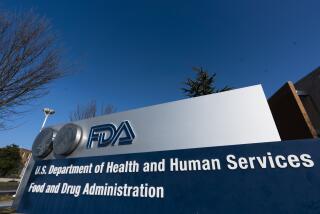Genetic Test Reveals Risk of Bad Reaction to AIDS Drug
SEATTLE — Researchers have for the first time found a way to identify people who are likely to suffer severe allergic reactions to the widely used AIDS drug abacavir.
About 5% of patients who receive the drug suffer vomiting, fever, rash and shortness of breath after taking it. In those cases, continued use of the drug, which has the trade name Ziagen, can be fatal.
Australian researchers reported here at the ninth annual Retrovirus Conference and in this week’s edition of the journal Lancet that the reaction occurs in people who carry a specific gene variant. By screening for the gene before beginning therapy, physicians can detect patients at risk and switch them to alternative drugs, said Dr. Simon Mallal of the Royal Perth Hospital. That would eliminate most of the adverse reactions, he said.
Researchers from GlaxoSmithKline, which manufactures the drug, reported similar results here.
“It’s a truly astonishing connection between a human genetic marker and the risk of a potentially fatal drug reaction,” Dr. Charles Flexner of Johns Hopkins University told a news conference.
In an accompanying editorial in Lancet, Dr. Amalio Telenti and his colleagues at University Hospital in Lausanne, Switzerland, predicted that it would soon be possible to screen patients for a large number of such genetic risk factors.
“This projection may look farfetched, with just a few relevant genes identified, but these are the first drops before a downpour,” they wrote.
But they cautioned that cost could be a major impediment. The screening costs about $500 per patient, they said. With 1 in 20 patients, on average, being at risk, the cost per case of hypersensitivity detected comes to $10,000 to $50,000, they said.
As more such genetic links are identified, the cost of screening will be reduced, making it a more cost-effective procedure, Telenti said.
The initial adverse reaction of patients to abacavir can be readily controlled by simply halting the drug’s use. But if the drug is started up again, the reaction becomes more severe and can even be lethal.
The incidence of the reaction varies among ethnic groups. Mallal said hypersensitivity occurs in about 9% of his patients, which is why he started trying to find a way to screen for it.
Mallal and his colleagues studied 167 HIV-positive patients who were known to be tolerant to abacavir and 18 who displayed hypersensitivity.
They found three genetic variants that were linked to the hypersensitivity. The most important was a gene called HLA-B5701. Patients with that gene variant were 100 times more likely to suffer an adverse reaction to the drug than those with other variants.






